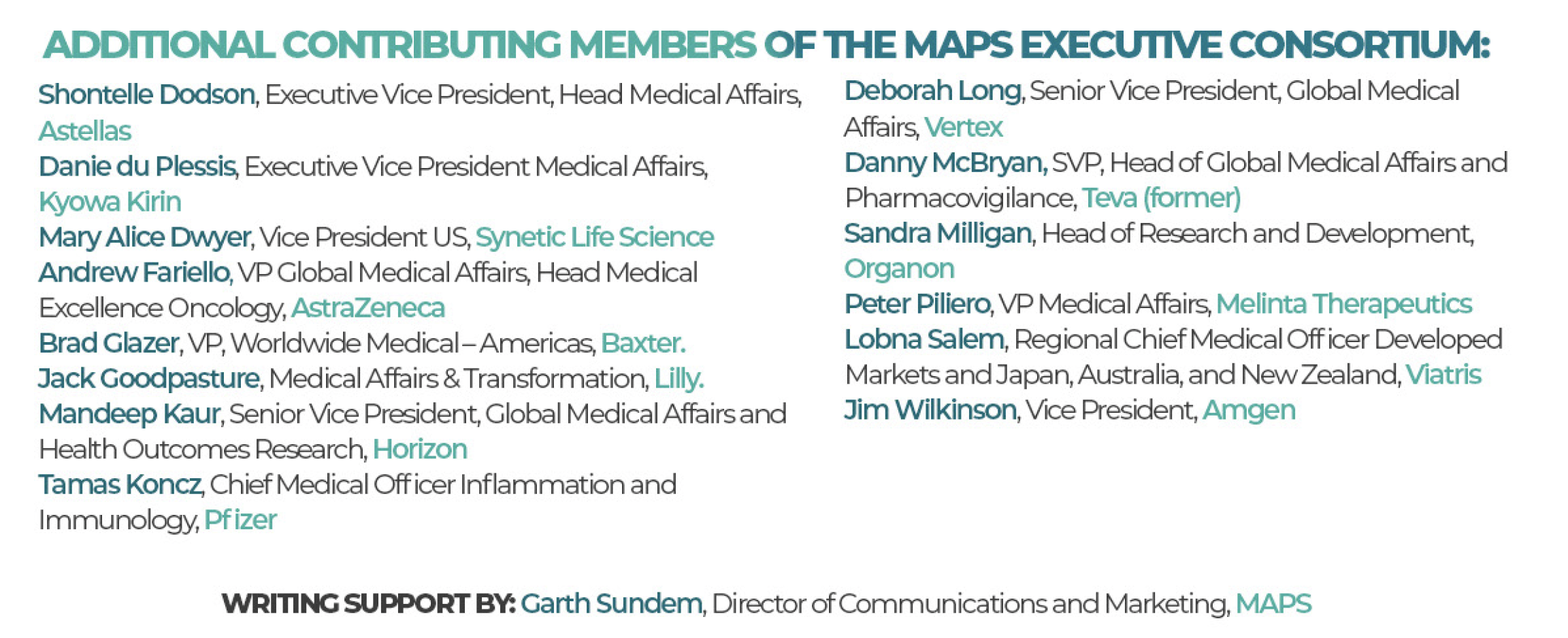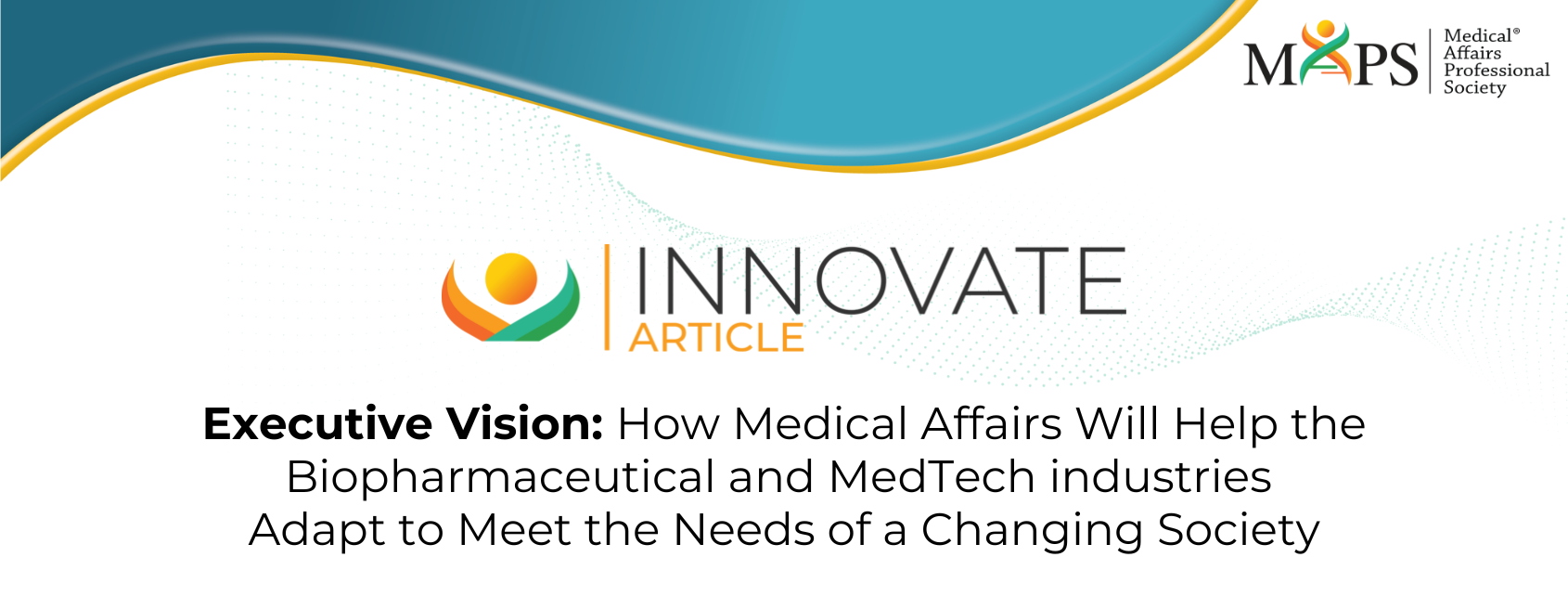Executive Vision: How Medical Affairs Will Help the Biopharmaceutical and MedTech industries Adapt to Meet the Needs of a Changing Society

Introduction
Society is changing. Industry must adapt along with it to ensure the drugs and devices we develop remain relevant to the needs of patients, providers, payers and other stakeholders. Medical Affairs is essential to this adaptation, providing firsthand understanding of the external healthcare ecosystem while acting as the voice of the patient within industry. Here we explore how Medical Affairs will drive the evolution of industry to match specific avenues of societal change. That said, this list is far from exhaustive, and the authors look forward to continuing the conversation about Medical Affairs as a critical partner, providing the clinical/scientific lens to help industry meet changing societal conditions.
Adaptation to Unforeseen Change
During COVID lockdowns, clinical studies ground to a standstill. Meanwhile, industry lost almost all face-to-face access to healthcare professionals, scientific leaders and patients. At the same time, supply chains were disrupted, placing the world’s supply of essential medicines and devices at risk. No one could have foreseen the extent of these changes or predicted the “butterfly effects” of downstream societal changes. And a global pandemic is just one on a list of possible disruptors, joined by war, natural disasters and many other unforeseen events. It is impossible to predict the myriad events that will force change; however, it is quite possible to build adaptable organizations with mechanisms to ensure agility in the face of an unpredictable and largely unstable landscape. Medical Affairs provides clinical and scientific expertise to teams of cross-functional partners to ensure that even amid dramatic change, patient needs are addressed, as evidenced by the following actions taken during the pandemic:
- Because of supply disruption, many Medical Affairs organizations were involved in helping companies provide medicines and devices through medical necessity to ensure that healthcare systems, practitioners and patients had continued access. For instance, some companies had to reallocate medicines globally, and some had to confirm that orders for products were medically necessary where supplies were limited. This put Medical Affairs in the center of ensuring access through utilizing our clinical expertise.
- Medical Affairs professionals monitored and authored pre-print publications to provide clinical assessments of and evidence for the utility of drugs, diagnostics and vaccines.
- Medical Affairs organizations developed technologic solutions to monitor studies remotely and to provide medical information to patients and healthcare professionals in order to communicate truthful medical information and to combat misinformation.
Technology
Technology has, is and will continue to fundamentally reshape society and industry. Medical Affairs plays a critical role in leveraging technology for the benefit of patients. This can include provision of medical information more completely and quickly in addition to monitoring of studies, use of smart connected devices to monitor patients and ensure accuracy and efficiency of healthcare. Internally, Medical Affairs will help industry adapt to technological-driven societal changes and will help industry leverage the opportunities of new/better technologies to upgrade internal capabilities. Myriad examples exist, from harnessing big data for evidence generation and insights, to content/communications capabilities powered by generative AI, to meeting the expectation for real-time data dissemination in an ecosystem of instant information. However, big data also presents the challenge of analysis without context: It may now be fairly straightforward for technology companies to create meta-analyses based on big data describing aspects of new treatments such as adverse events, and it will be increasingly important for Medical Affairs to provide scientific and clinical perspectives to accurately contextualize data-generated “conclusions” and to refute any potential misinformation.
Real World Evidence (RWE)
Real-World Evidence generation/collection, analysis and communication can in many ways be seen as subsets of industry capabilities transformed by technology. However, because new technologies provide more powerful analyses to enable Real World Data (RWD) to be transformed into RWE, RWE in general can now be used to create robust knowledge in domains that were previously addressed primarily by clinical studies. In other words, the digital transformation of RWE gives more weight to knowledge generated by RWE methodologies. For example, India, China, the UAE and many other countries are now accepting RWE studies for regulatory submissions. The efficiency of RWE also allows studies leading to line extensions in targeted subpopulations that would previously have been cost-prohibitive. As senior leaders start to appreciate the power of RWE to drive regulatory and business outcomes, Medical Affairs will have an increasingly important role to play in company evidence generation activities – and will need to build appropriate capabilities in epidemiology, population health, HEOR, data analytics, etc. to capitalize on this opportunity.
Misinformation
Today, as patients and caregivers become more involved in treatment decisions, outcomes become increasingly dependent on currents of understanding and misunderstanding in the wider population. In cases of ideological misinformation, Medical Affairs will need to leverage the trust in the function to speak as industry’s voice of reason; in more nuanced cases, Medical Affairs may need to determine what is, in fact, misinformation, and build evidence-based cases to correct misunderstandings. The need to address misinformation in the public sphere will require Medical Affairs departments to augment capabilities for engaging directly with nonscientific members of the external healthcare community, including patients and caregivers. Driving public understanding of industry science may also require Medical Affairs to expand its understanding of the stakeholders we engage: If engagement of scientific opinion leaders is required to ensure healthcare professionals make the best use of industry innovations, then engagement of digital opinion leaders may be required to ensure that patients can accurately assess providers’ recommendations and refute misinformation.
Increasing Need for Value Evidence
The true north of Medical Affairs is to ensure patients benefit from industry science and technology, which requires ensuring that patients can access these innovations. However, as innovative treatments are developed for more targeted patient populations, the cost of care for many conditions is rising just as healthcare systems are under increasing pressure for efficiency. The result is increased need for robust evidence demonstrating both the impact of new treatments in all types of patients and on the healthcare system. This shift can be seen in both MedTech and pharma, with guidelines in many parts of the world now setting a much higher bar for the evidence needed to earn medical device approval, along with FDA guidance requiring companies in the U.S. to have a clinical diversity plan in place for all products in development. In this context, it will be critical to collaborate with partners in Market Access and across the organization to generate evidence defining the value of our products and ensure reimbursement so that patients have access to care.
Environmental, Social, Governance (ESG)
Society now demands that drug and device development take into account the needs of non-majority populations. Medical Affairs is positioned to drive this adaptation, establishing relationships with healthcare professionals and patient advocacy groups in underserved communities to identify and address unique barriers to, for example, clinical trial participation and access to medications. In this way, Medical Affairs ensures industry generates outcomes in populations of patients that will be treated with our products. Meanwhile, Medical Affairs is also equipped to help industry adapt its practices and messaging on environmental issues such as climate change. By taking into account the needs of individual patients, patient populations, and the collective needs of society, Medical Affairs will lead the way toward transformation of public opinion regarding the biopharmaceutical and MedTech industries as a whole.
Conclusion
To maximize the impact of emerging drugs, diagnostics and devices, industry will need to adapt alongside society, keeping pace with changes in the cultural, technological and socio-political landscapes. The ways we have done things in the past no longer meet the needs of patients who are active participants in their care, amid a technology-enhanced information ecosystem in which opinion hinges on digital influencers. In this brave new world, Medical Affairs can cut through the noise. We have new ways to create evidence and knowledge. We have new ways to engage in scientific exchange. We have the opportunity to lead a new appreciation of industry as an agent of positive change. And through these activities, Medical Affairs has the opportunity to infuse drug and device development with the new needs of patients and caregivers to maximize the utility of industry innovations and ensure that patients will benefit from our science and technologies.
This article is part of our Executive Vision series, an initiative from the MAPS Executive Consortium. To learn more, please visit our Industry Partnership Program page.



